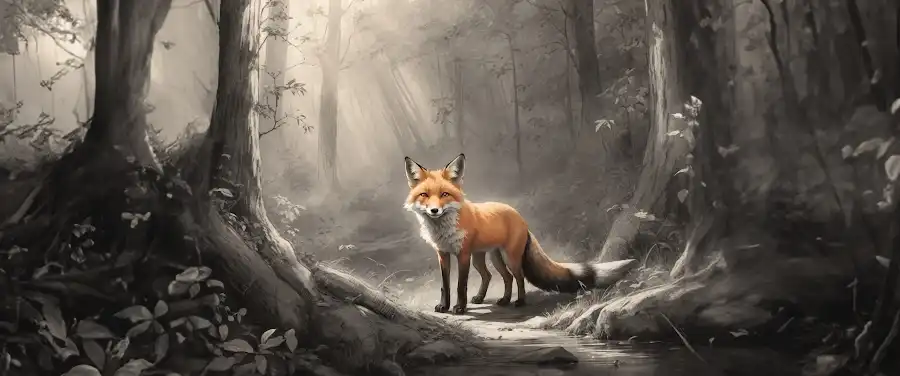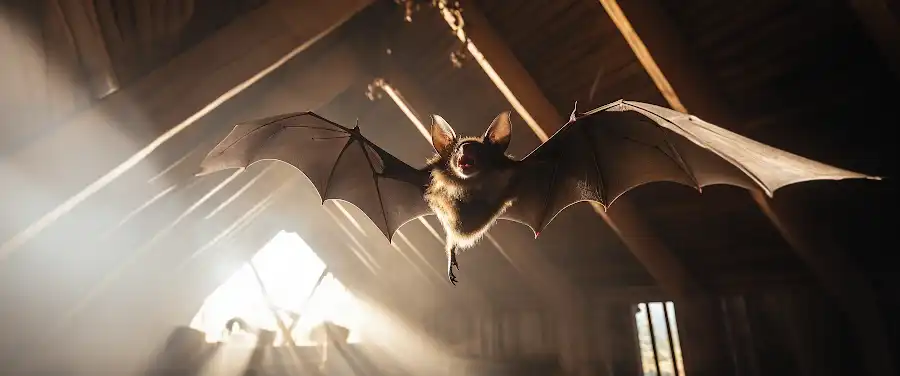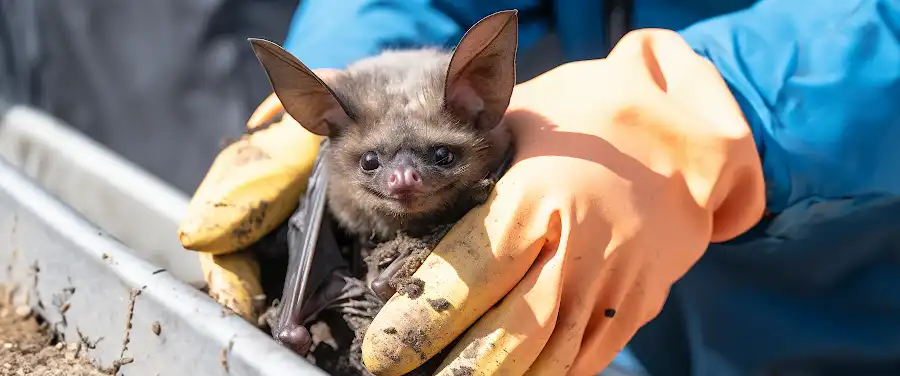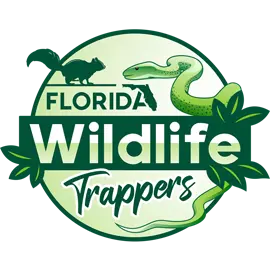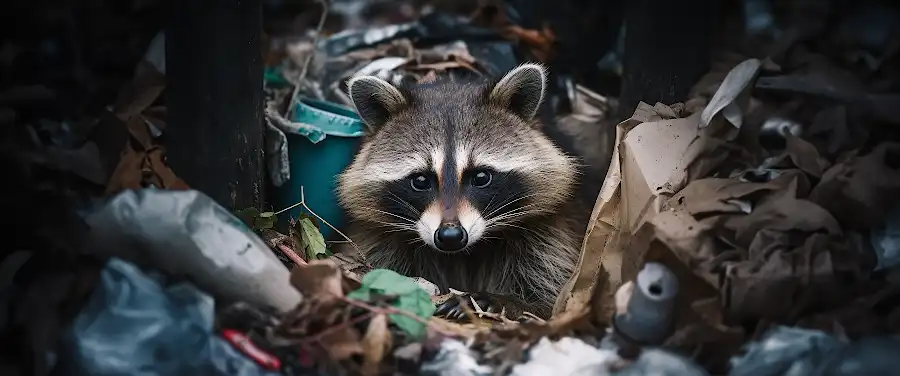
Have you ever crossed paths with a mischievous raccoon rummaging through your trash bins or perhaps, spotted one in your backyard? If so, your first reaction might have been a mix of an adrenaline rush and a slight giggle at their infamous ‘masked’ look. Cute as they might appear, these little bandits are notorious for their mess and chaos, especially when it comes to raccoon waste clean-up.
It is not just about the ransacked trash cans and scattered rubbish. Raccoon waste is as distressing as it sounds; it poses significant health risks and often requires professional handling. The importance of clean-up lies in its potential to affect your family’s and pets’ health, also the fact that it aids in discouraging further visits from these unwelcome guests.
Let’s turn the spotlight on something not talked about often but equally crucial – dealing with their ‘left-behind’ waste. Here’s your chance to dive into some hidden facts about raccoon waste cleaning and why it’s essential to handle this issue with utmost concern. In the next section, we’re about to unearth more on ‘What is Raccoon Waste?’. Buckle up; this might not be the typical cuddly animal topic, but it’s incredibly important!
Why is Raccoon Waste Dangerous?
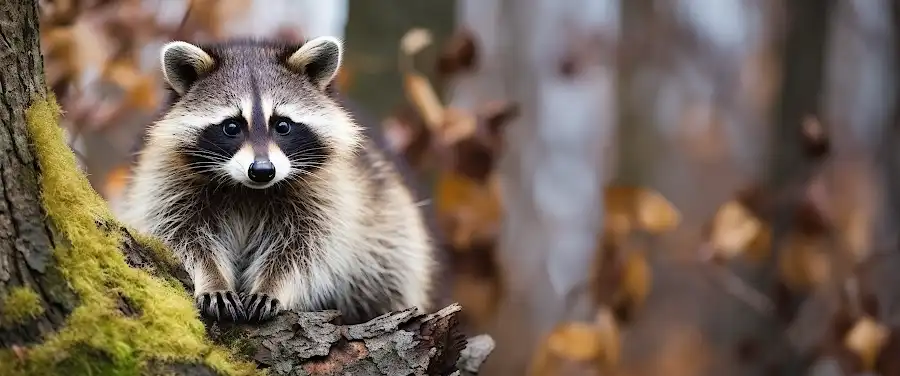
Raccoon waste, or feces, poses significant health risks that you should not underestimate. While raccoons might seem cute and harmless, their waste is a different story altogether. In fact, it’s a hotspot for various diseases and parasites. Some of these include Rabies, Roundworm, and Leptospirosis.
In terms of statistics, the Centers for Disease Control and Prevention reports that Raccoons are responsible for about 30% of all reported cases of rabies in the U.S. That’s a non-negligible ratio, and it highlights the importance of dealing with raccoon waste and cleanup effectively and promptly.
Let’s delve into these diseases at a glance:
| Disease | How it’s Transmitted | Symptoms |
|---|---|---|
| Rabies | Through bites and scratch from an infected animal | Fever, Headache, General Weakness and Discomfort |
| Roundworm | Ingestion or inhalation of eggs from feces | Nausea, Fatigue, Liver Enlargement, Loss of Muscle Control |
| Leptospirosis | Contact with urine of infected animals | High Fever, Headache, Chills, Muscle Aches, Vomiting |
These ailments can cause serious health complications or even be fatal if not promptly treated.
The critical thing to remember is that you should avoid direct contact with raccoon waste. Also, do not allow it to linger around your home or business environment. Additionally, ensure you maintain the utmost caution when dealing with raccoon waste and cleanup to minimize health risk.
Responsive to this immediate threat, there are a plethora of professional services ready to assist in dealing with raccoon waste and cleanup. For further details, consult the Humane Society’s guide for safe cleanup of raccoon latrines!
Now that we have a clear frame of the threats posed by raccoon waste, it’s high time we understood its potential impact on our homes.
How Can Raccoon Waste Affect Your Home?
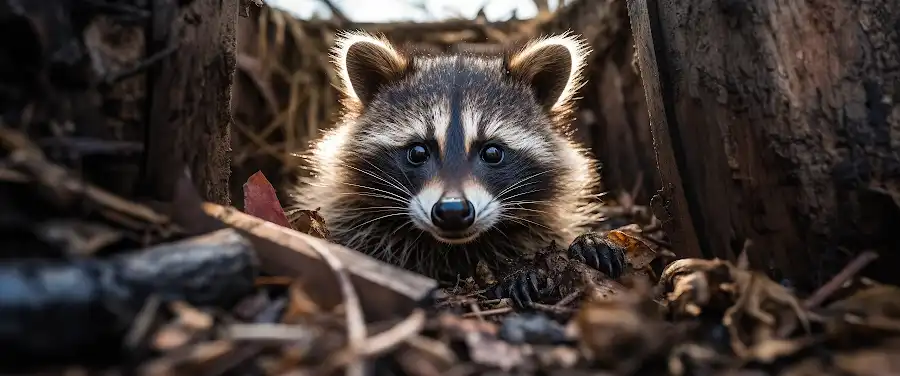
When raccoons make their way into our homes, they come bearing lots of unpleasant surprises. Their waste has harmful impacts on household items, creating an unsanitary environment and health risks for both pets and kids. Let’s unravel the implications of dealing with raccoon waste and cleanup.
Harmful Impact on Household Items
Raccoons are crafty creatures, and their waste can bring about considerable damage to your home. They often nest in attics, sheds or basements where they leave their droppings and urine. Over time, this waste can contaminate insulation, soil woodwork, and cause lasting structural harm. Data from the National Pest Management Association highlights that wildlife pests like raccoons cause $5 billion in property damages annually in the U.S.
The Unseen Danger to Pets and Kids
The impact of raccoon waste goes beyond physical damages. It poses a potential health risk, especially for pets and kids who are closer to the ground and more likely to come into contact with the waste. Raccoon feces carry dangerous parasites like raccoon roundworm, which can be transmitted to humans and pets causing serious illnesses.
The Smell and Hygiene Issues
We can’t forget about the unpleasant smell that accompanies raccoon waste. Dealing with strong, foul odors can be overpowering and distressing. It certainly doesn’t help with raccoon waste and hygiene within your home. This smell may attract other pests, creating a vicious cycle of infestation and cleanup.
Dealing with raccoon infestation not only involves removing the culprit animals but also requires an adequate cleanup procedure to quell these concerns. It is essential to engage professionals who are trained for such cleanup processes to ensure waste and any pathogens are thoroughly eliminated.
Transitioning from the aftermath of raccoon waste, how can we identify raccoon waste and infestation in the first place? Let’s dive in.
How to Identify Raccoon Waste / Infestation?
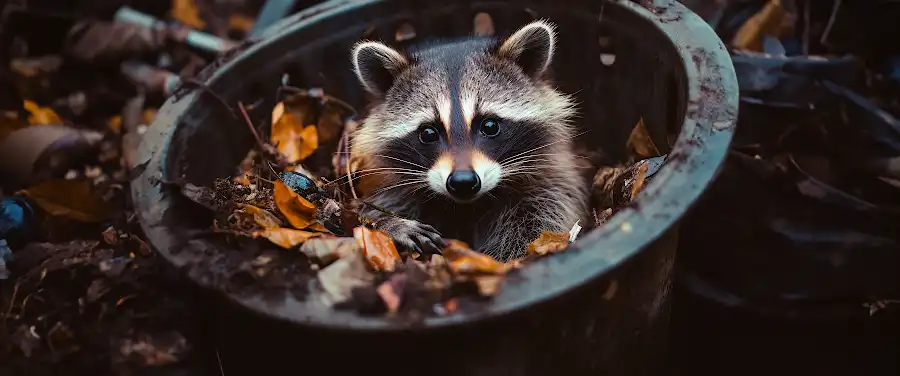
Discovering a raccoon infestation can feel like an episode from a mystery thriller. Unsettling noises echo from your attic, garbage bags are torn asunder and strange footprints lead to nowhere. You start questioning – is it all in your head or is it really the reflection of a raccoon presence?
Understanding the signs of raccoon infestations is the first step in managing the furry trespassers. Here’s a guide to help you identify signs of mid-night visitors, and deal with the subsequent raccoon waste and cleanup.
Physical Evidence
Remember the notorious ‘Hansel and Gretel bread crumbs’? You might be dealing with a raccoon version of that fable. Discarded food items, garbage tampering, and distinct footprints are some of the things that could indicate a problem. Other signs include droppings resembling blackberries or dark tubes filled with berry seeds, nuts, or other food remnants. These are distinct markers of raccoon waste evidence.
Noises
Often before you see them, you’ll hear them. Raccoons are nocturnal creatures, so pay attention to the unusual full-moon thumping, scratching and chattering noises around your house, specifically from your attic or roof.
According to pest control experts like us, the unique sounds they produce provide vital clues about their number, size, and activity.
Damage
Are your plants savaged and pots overturned as though attended by a mischievous intruder? Lying in the wake of raccoon visitation, you’ll find damaged vent screens, roofs, and frequent interruptions to your cherished gardening efforts.
And there you have it – identifying a raccoon infestation, complete with raccoon waste evidence, is like cracking the code of a nature-inspired whodunit. Now that you have delved into the sings and sounds of raccoon presence, it is time to move on to the next significant step: learning how to safely handle raccoon waste. Remember, being armed with the right knowledge can truly make a difference.
Remember that raccoon feces, much like any other animal waste, can carry parasites, so always approach with caution while dealing with raccoon waste and cleanup. Stay tuned to learn more in the next segment!
How to Safely Handle Raccoon Waste

Whether you’ve discovered a raccoon’s den in your attic or noticed some suspiciously small, round droppings in your garage, dealing with raccoon waste and clean-up can be an unpleasant and serious task. It isn’t something you can simply sweep under the rug. Proper precautions must be taken to ensure safety as raccoon waste can carry harmful diseases such as Baylisascaris procyonis, a type of roundworm.
Before undertaking a task like this, here are the key points you need to consider:
- Understand the risks and the potential diseases associated with raccoon waste.
- Ensure that you have the necessary personal protective equipment (PPE) to carry out the task.
- Educate yourself on how to properly clean up raccoon waste to minimize potential health risks.
Personal Protective Equipment (PPE) Recommended for Cleaning Raccoon Waste
Picture this: you’re outfitted in disposable gloves, a dust mask, and overalls. There’s a strong, heavy-duty trash bag at your side. This isn’t some new fashion trend, but rather your go-to outfit when embarking on a raccoon waste cleanup mission.
The Centers for Disease Control and Prevention recommends gearing up with the following equipment when disposing of raccoon waste:
- Disposable gloves
- Dust mask (N95-rated)
- Plastic overalls
- Boots or protective shoe covers
- Heavy-duty trash bag
- Detergent
CDC’s prevention guide is a useful reference source when dealing with raccoon waste. It’s always important to play it safe and take every necessary precaution when engaging in this process.
Safely handling raccoon waste is vital, and these precautions can make a world of difference. Following this protocol can greatly reduce the risk of contracting diseases from raccoon waste, making the cleanup process simpler and safer. Remember, your safety should always come first.
As you prepare to venture into this necessary task, remember these key points and stay protected. Now that you’re equipped with knowledge and proper PPE, let’s dive into the next crucial phase – “How to Clean Raccoon Waste?”
Dealing with Raccoon Waste and Cleanup
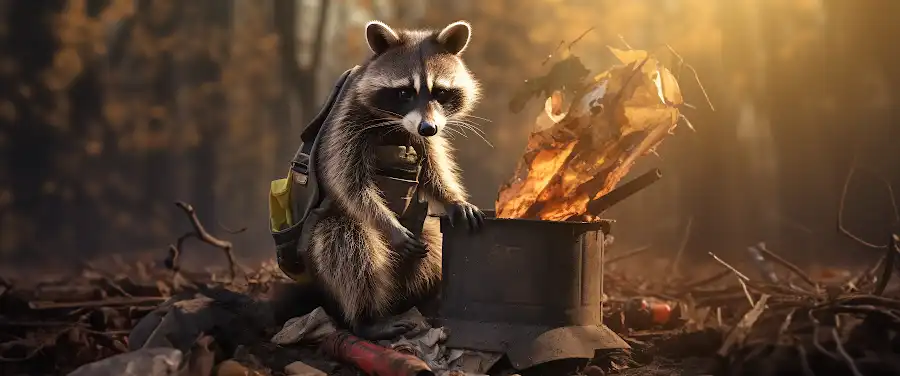
Raccoons can make a mess – whether in your attic, yard, or elsewhere. Their nests often introduce both harmful bacteria and parasites that can cause serious illnesses. Hence, it’s absolutely crucial to properly clean up after a raccoon infestation. Let’s take a close look at the initial clean-up steps, preferred sanitizing methods, and when you might need professional clean-up assistance.
One important disclaimer before diving in: always wear gloves and protective clothing when dealing with raccoon waste to avoid direct contact, and thereby, prevent catching diseases.
Initial Cleanup Steps for Raccoon Waste
Armed with gloves and a mask, start the cleaning process by removing raccoon droppings and any contaminated material. Here’s a general quick-start guide:
- Insulate and bag the waste properly to prevent the release of potential harmful spores.
- Dispose of the Insulated bag in outdoor garbage bins.
- Thoroughly clean the area with water and regular detergent.
- Lastly, decontaminate the area with an effective sanitizer, more on this later.
Even so, bear in mind that cleaning raccoon waste steps can vary depending on the severity and the place of infestation.
Preferred Sanitizing Methods
Raccoon waste often contains microscopic roundworm eggs that are highly resistant and potentially harmful to humans. Therefore, simple cleaning might not cut it; comprehensive sanitation is also needed.
In order to destroy these microscopic nightmares, a propane torch is commonly used. The heat helps in killing the roundworm eggs. However, it is seriously advised to take caution when using this approach, especially inside the house.
If you would rather go the chemical route, a bleach solution of 1-part bleach to 9 parts water can also be effective. Keep in mind, though, that bleach does not penetrate certain materials, like wood, effectively.
Need for Professional Cleanup Assistance
You might be a savvy DIY-er, but tackling raccoon waste might need more than your usual toolkit. Depending on the situation, it might be best to seek professional clean-up assistance.
Professionals bring expertise, necessary tools and most importantly, they know how to deal with raccoon waste without putting themselves – or you – at risk.
Dealing with raccoon waste is quite an ordeal, involving several steps and potential hazards. The following table provides a comparison of DIY and professional waste cleanup.
| DIY cleanup | Professional cleanup |
|---|---|
| Requires protective gear | Professionals come equipped with necessary protective gear |
| Time-consuming | Professionals can clean faster with access to commercial-grade tools |
| Inexperience may result in incomplete clean-up | Extensive experience ensures comprehensive cleanup |
| Potential risks of direct contact with harmful substances | Minimal risk as professionals follow safety standards |
You might be a savvy DIY-er, but tackling raccoon waste might need more than your usual toolkit. Depending on the situation, it might be best to seek professional clean-up assistance.
Professionals bring expertise, necessary tools and most importantly, they know how to deal with raccoon waste without putting themselves – or you – at risk.
Dealing with raccoon waste is quite an ordeal, involving several steps and potential hazards. The following table provides a comparison of DIY and professional waste cleanup.
Conclusion
In wrapping up this enlightening journey into the world of raccoon waste and cleanup, it has become clear that dealing with raccoon waste is a concern many who encounter these critters share. However, the importance of handling such a predicament appropriately goes far beyond mere nuisance control.
Indeed, keeping your environment safe and raccoon-free is a health matter that we can’t stress enough. It’s even more imperative when you consider the wide array of diseases that raccoons can potentially carry – from leptospirosis to rabies.
Therefore, it’s not just about making a home less desirable for these bushy-tailed bandits. Equally crucial is the appropriate management of waste, once a raccoon has set camp in your area.
However, we must recognize that the task isn’t always a walk in the park. We’ve seen the intricate steps involved in the cleanup process and the various considerations to adhere to. This includes safe disposal of feces, sanitizing affected areas, and making sure protective gear is worn through it all to avoid direct contact with hazardous waste.
If you ever feel overwhelmed by the task or have a niggle of doubt about your ability to do it properly, don’t beat yourself up, there’s no shame! This is where professional intervention comes in handy. Trust us, it’s worth the investment. Experts have the right tools, knowledge, and experience to execute this task effectively and safely.
Above all, it’s essential to learn from this experience. After going through this painstaking cleanup process, you surely wouldn’t want a rerun. Therefore, be proactive in implementing raccoon deterrent measures like securing your trash, feeding pets indoors and pruning trees near your house.
Let’s not forget, raccoons are wild animals. We should coexist without exposing ourselves to potential harm they might inadvertently cause.
Thank you for joining us on this deep dive into the world of dealing with raccoon waste and cleanup. We hope this information has been illuminating and practical. Stay safe and remember – when in doubt, don’t hesitate to reach out to the professionals!

